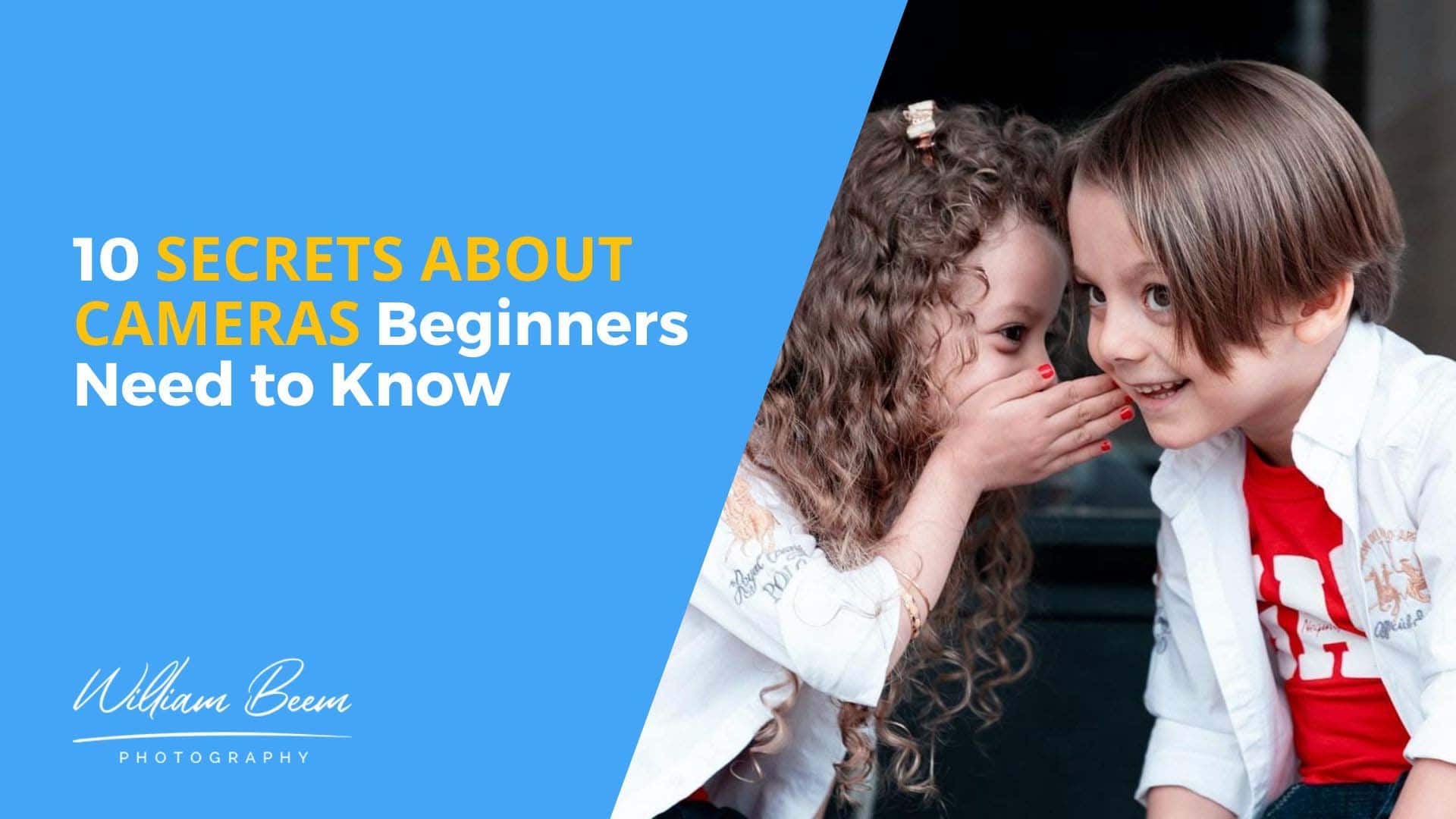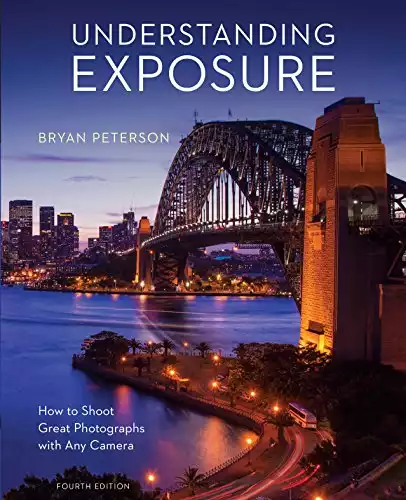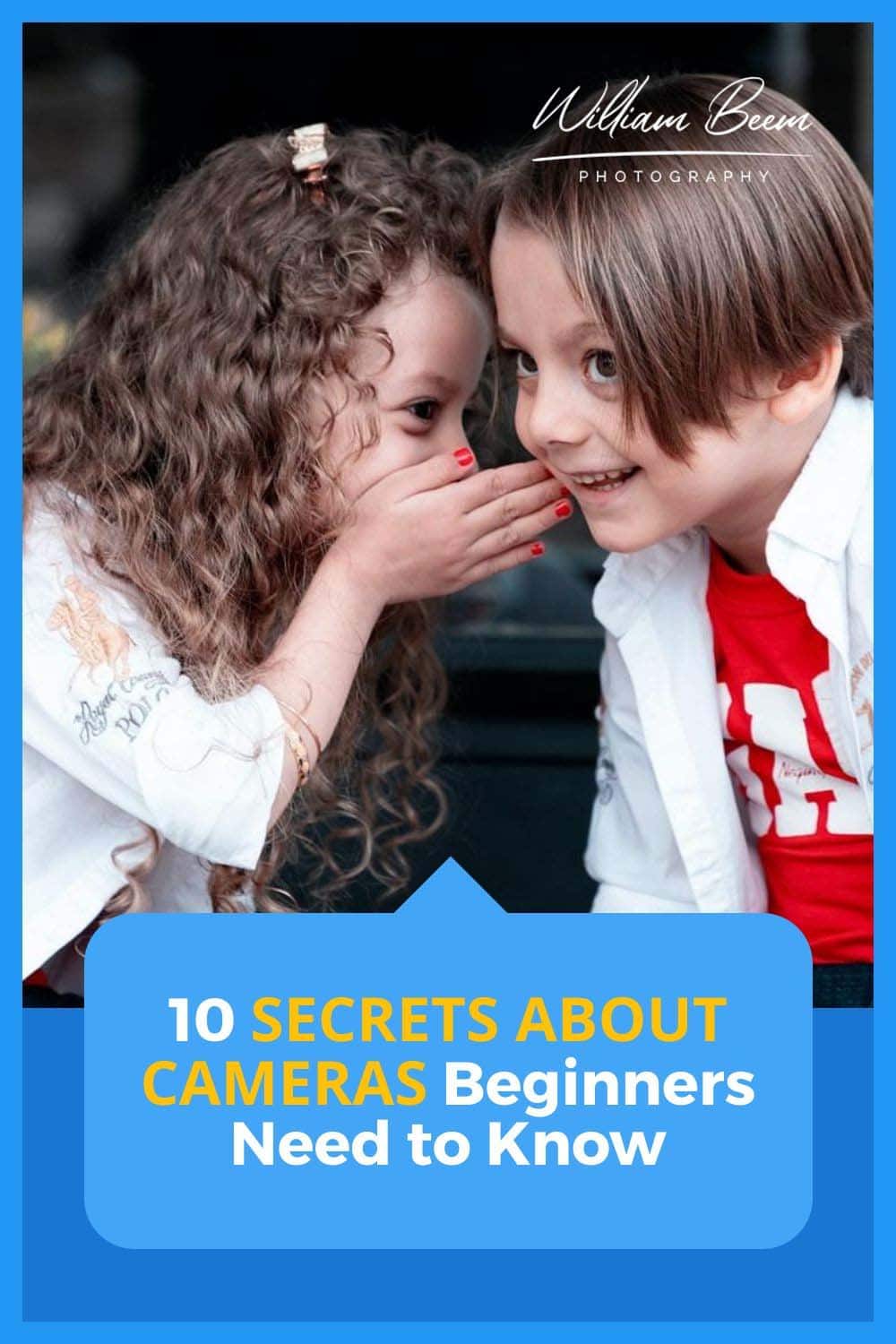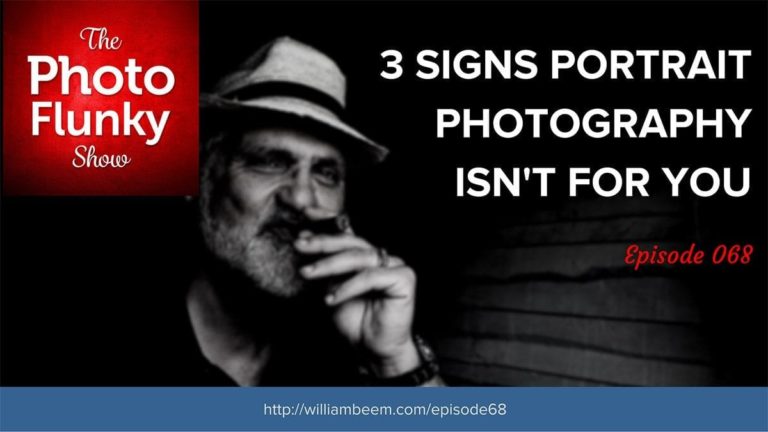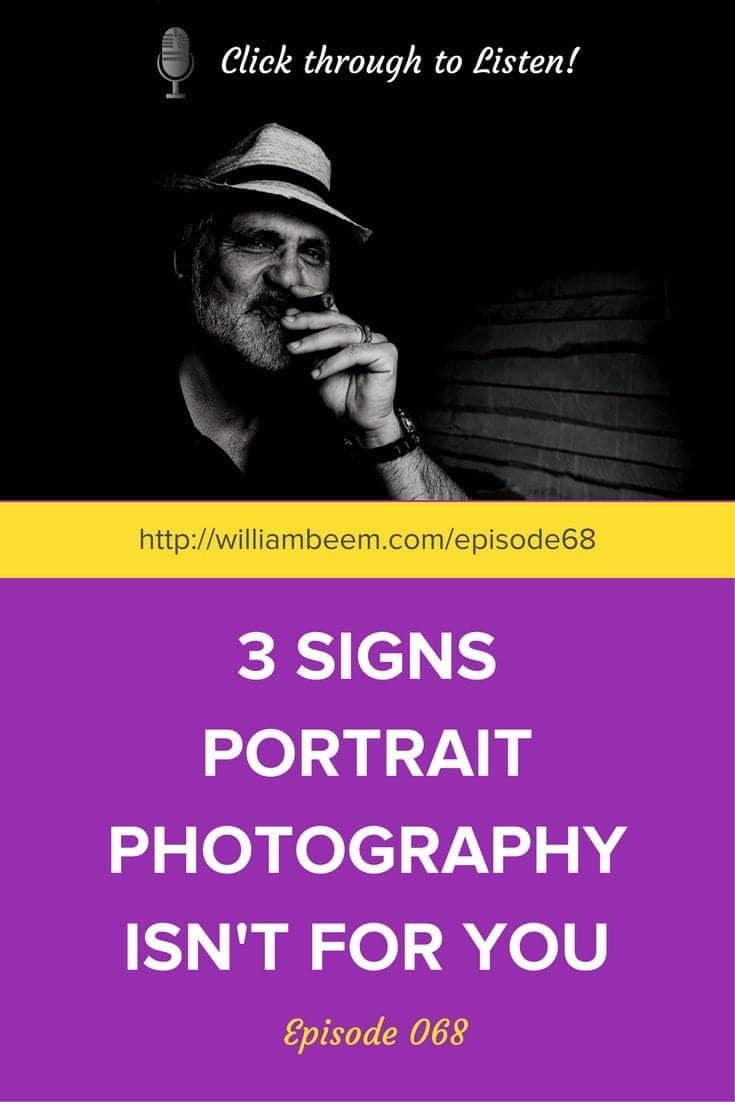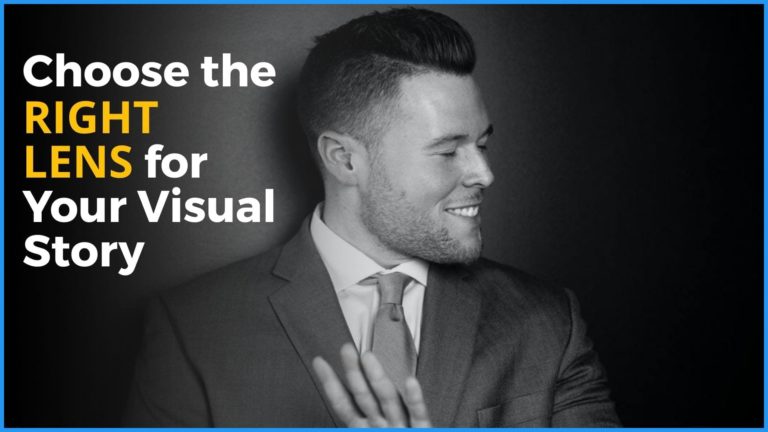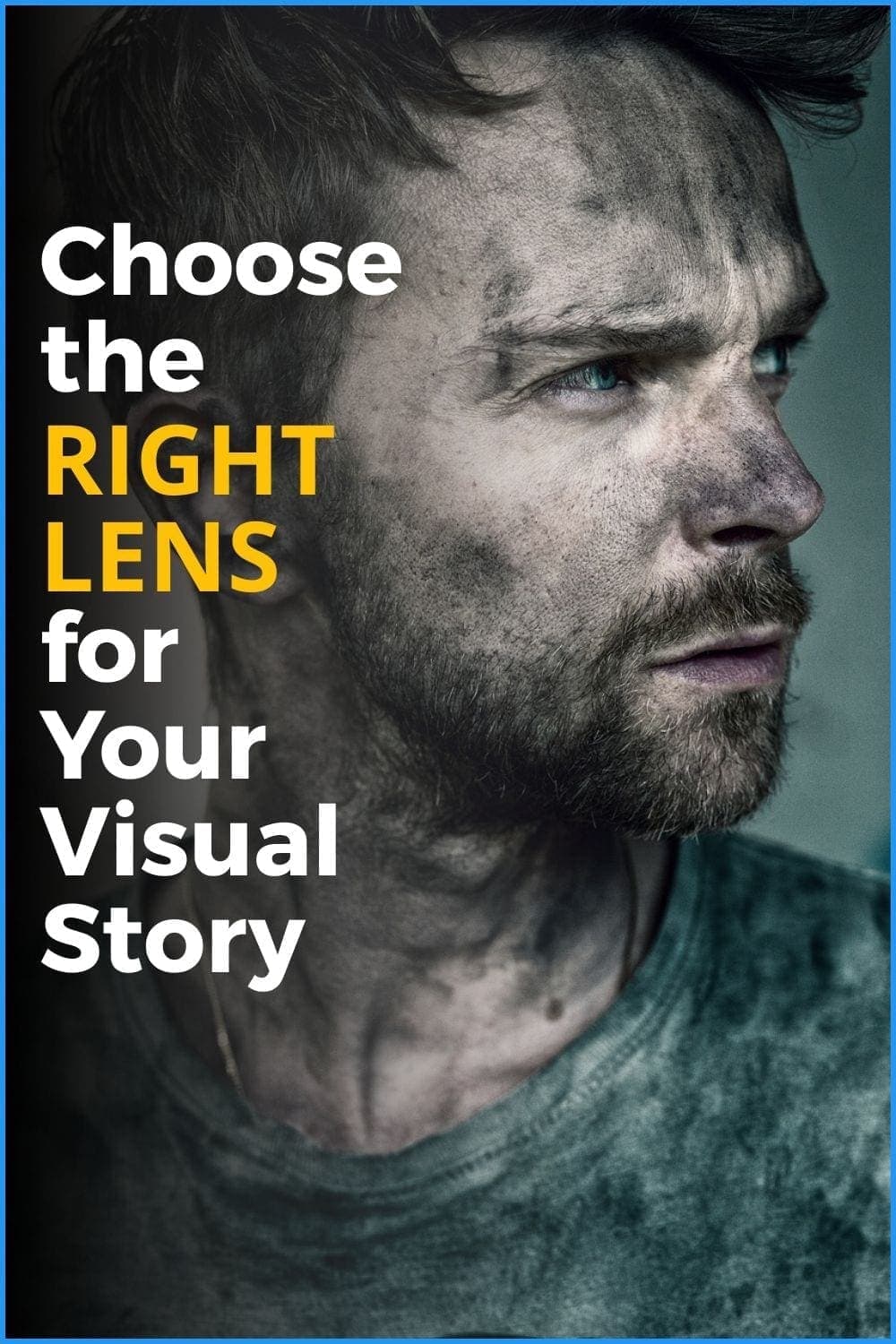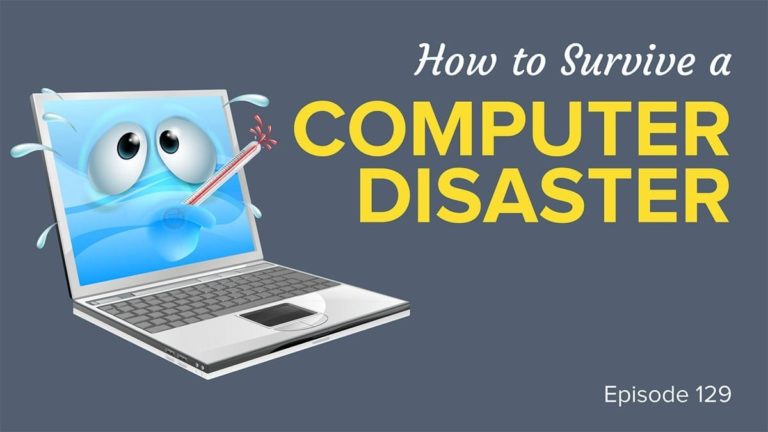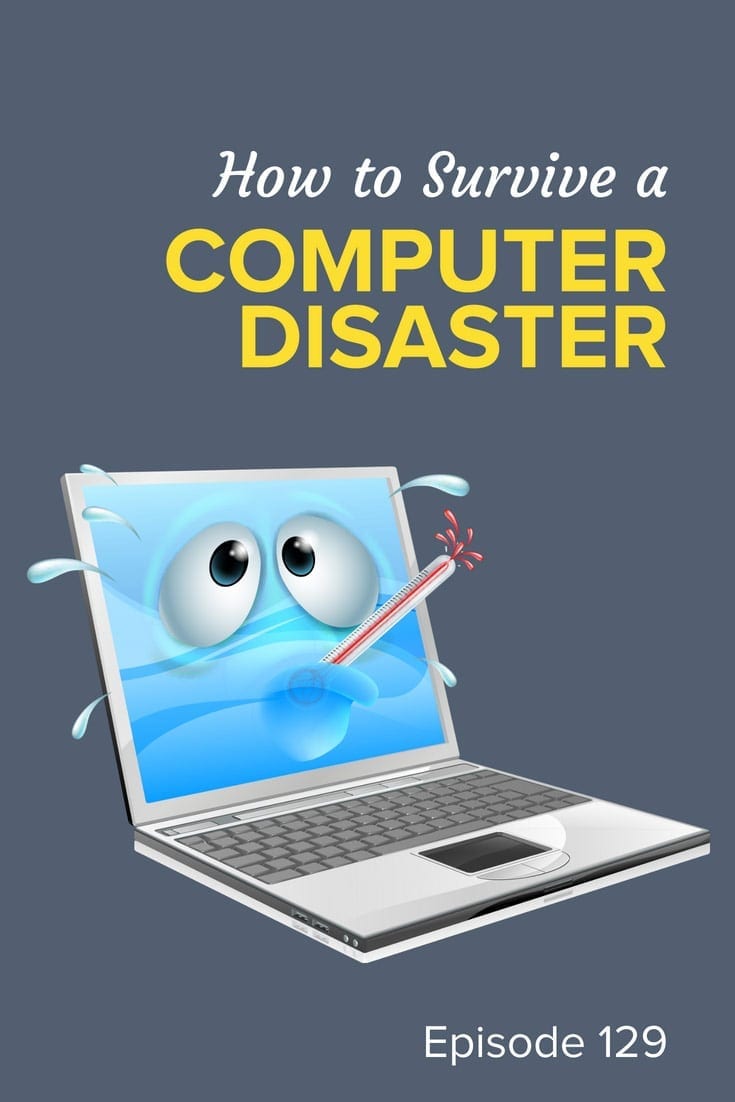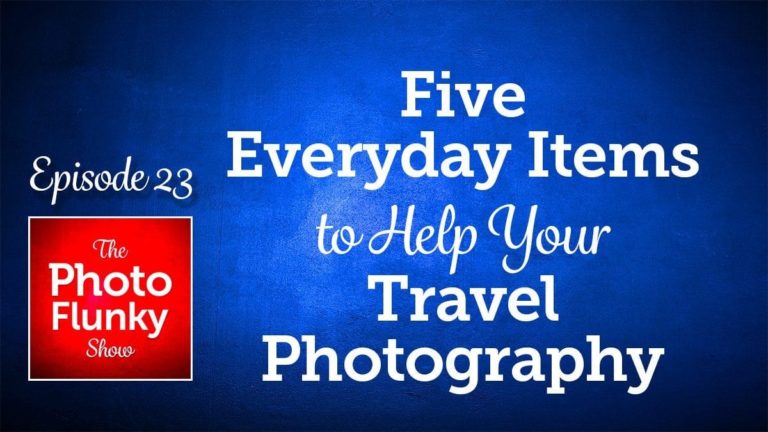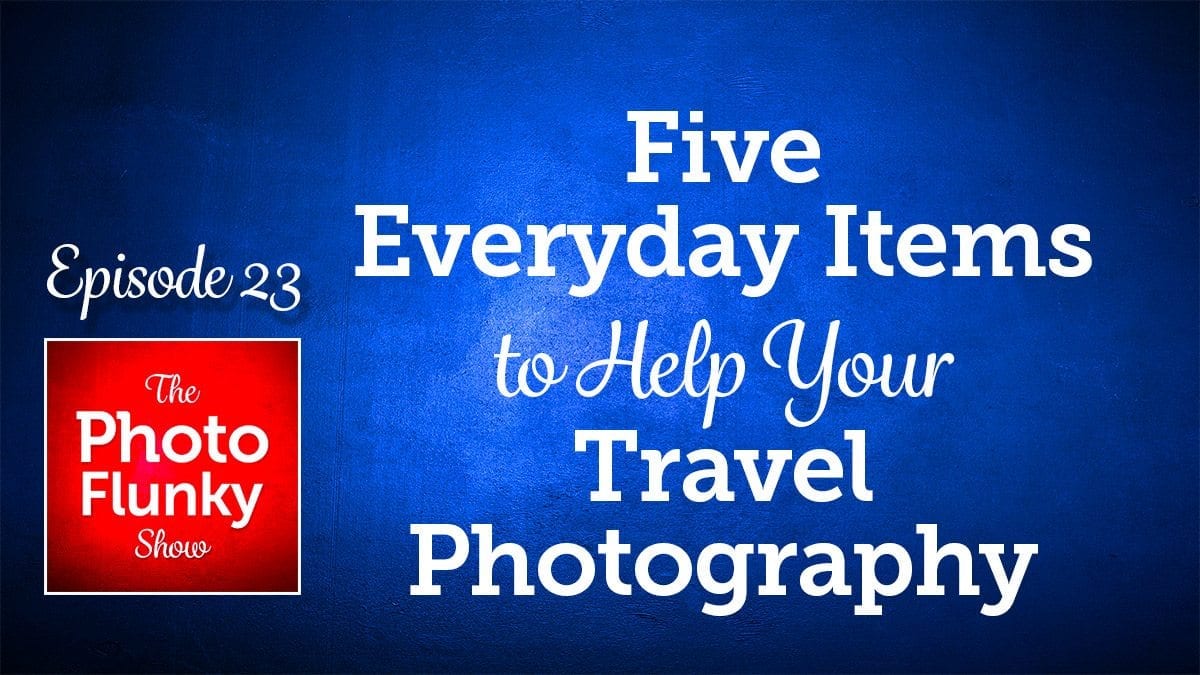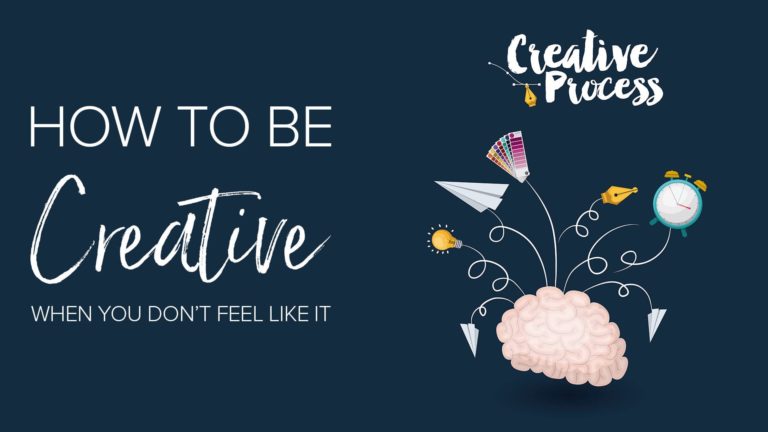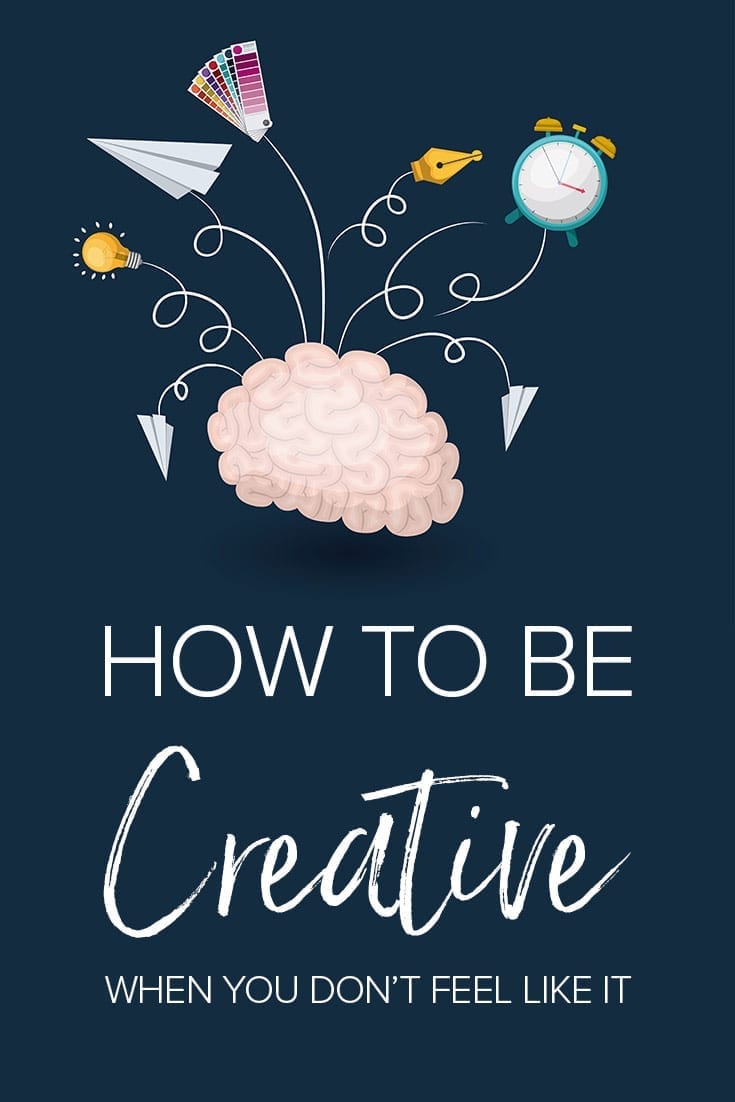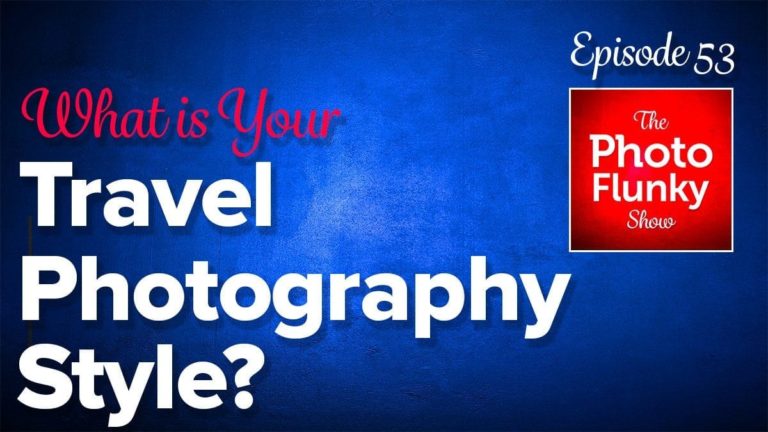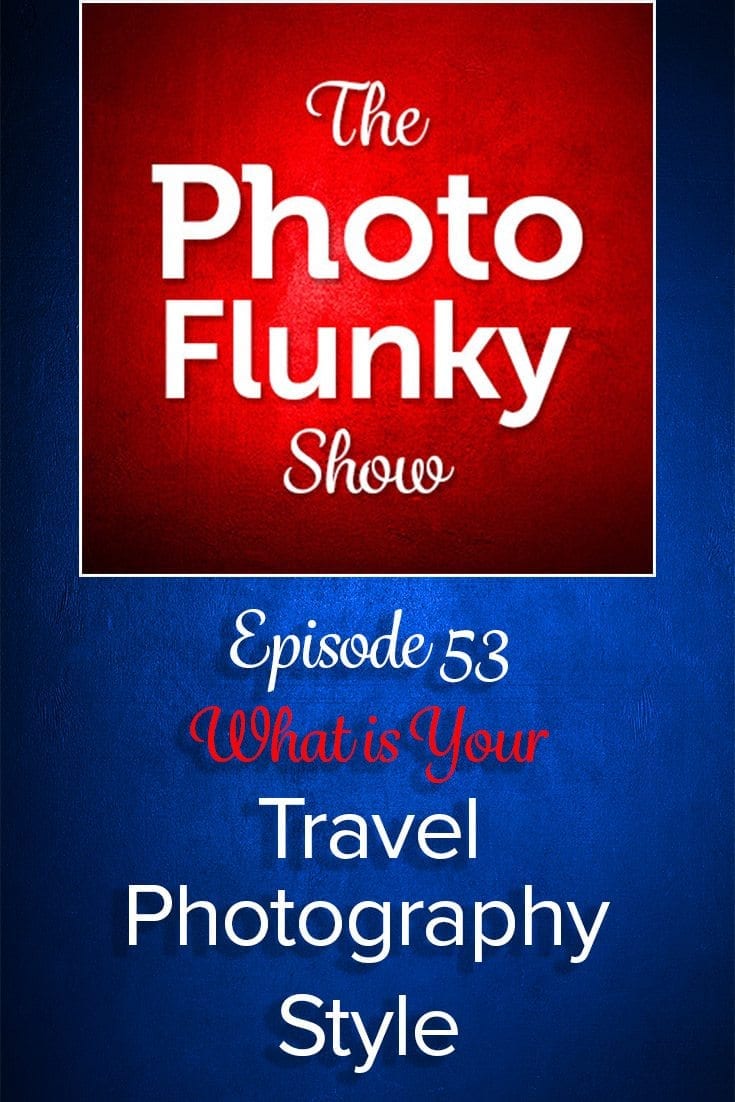Affiliate Disclosure: We earn a commission if you purchase through one of our links at no additional cost to you.
Before you buy a camera to get started in photography, check out our 10 secrets about cameras. Beginners can get easily misled by marketing, so we’ll help you understand that the best camera for you is the type that’s best for the photographer that you want to do.
10 Secrets About Cameras that Marketers Don’t Want You to Know
In high school, I bought an Olympus OM-10 camera as my first SLR. Why did I choose that camera?
Marketing!
If it was good enough for Cheryl Tiegs, then it was perfect for me. Olympus marketed this camera as the best tool for new photographers.
I still have that camera and it served me well as a beginner. However, I outgrew it because it didn’t have the features I needed for the photography I eventually wanted to do.
All cameras have the same basic functions, but the differences some out in a variety of ways that we discuss in this episode.
The 10 secrets about cameras beginners need to know came from a post I wrote about 101 secrets for emerging photographers. We’re taking some time in a series of podcast episodes to dive a bit deeper into each section of that post.
With that in mind, here’s our list of 10 secrets about cameras.
1: A Camera is Just a Tool
All cameras use the same three variables to take a photo.
If you put the camera on the ground and tell it to go take photos, nothing happens. The camera is only as good as you are.
It’s hard to buy a bad camera these days, too. My wife and I both enjoy taking photos of fireworks. She has a crop-sensor, inexpensive camera. I have an older, but more expensive full frame camera.
Honestly, we can’t tell the difference in quality between her photos and mine.
2: The Type of Photography You Do Most Decides Which Camera is Best for You
The reason some cameras cost more than others typically has to do with features. Weather sealing, faster frame rate for burst photography, better sensor for light light or dynamic range.
There are tons of features for different cameras, but do they matter to your photography? Why get a very heavy pro grade camera with a fast frame rate if you only need to photograph daisies?
The type of photography you do can guide what type of camera you need. The most expensive camera may not be best for you. The same is true with the newest camera.
3: The System is More Important Than the Brand
Many camera manufacturers have two systems currently, if not more. There’s a DSLR system and a Mirrorless system.
Nikon created an adapter so I could use my older DSLR lenses on their new mirrorless cameras. However, I can’t use their new mirrorless lenses on my old DSLR.
Likewise, I can’t use a Canon lens on my Nikon.
Take a look at how you expand the system for the camera model you have in mind. Some systems may provide more value than others.
4: Not All Memory Cards Are Created Equally
Many people worry about card corruption. It’s never happened to me. It’s happened to Lee once, and with a premium brand of card.
My advice is not to buy the cheapest brand around, and don’t pay for the most expensive brand around. Find a quality brand with middle-of-the-road pricing.
Format the card when you put it in your camera. Don’t delete photos in-camera. After you export your photos to a computer, format the card again.
That’s worked for me.
I use memory cards from Hoodman USA. They don’t pay me anything and they claim that their cards never fail. Mine haven’t, at least so far.
I've used Hoodman USA memory cards for years and never had a single failure.
Hoodman USA has been making memory cards for digital cameras since 2006, and they're some of the best on the market. They're small and precise, with components tested to the highest standards to ensure reliable image quality. And their all-metal card readers are ruggedized to withstand punishment. If you're looking for a memory card that will give you years of trouble-free service, Hoodman is the brand I trust and recommend.
5: Every Camera has Features and Limitations. Choose the Camera With the Right Benefits
Do you need video? Do you need a fast frame rate to capture objects or athletes moving at a high rate of speed?
Don’t pay for features that you don’t need.
Likewise, be aware of the limitations of your camera. Less expensive cameras likely don’t have a fast frame rate, so they’re not good for sports or action.
Think about how you need to use your camera and come up with a list of things you can’t live without, and then find the camera models that have what you need.
Just be honest with yourself, though. It’s easy to think you need something and then never use that feature. That’s a want, not a need.
6: Great Cameras are Heavy
The flagship cameras from every vendor are big and heavy. They’re also great at what they do. All the features are in there.
All the features, except lightweight.
It’s easy to get caught up in marketing hype and decide you need what the pros use. Here’s another secret. I know pros who still use cameras more than a decade old because they do what the photographer needs.
Specs don’t sell photos. Specs don’t take great photos. That’s up to you.
7: When You Don’t Have a Working Camera, You Are No Longer a Photographer
If you have one camera and it stops working, you are no longer a photographer.
How important is your photography in determining whether you need a backup camera or not? If you’re working for clients, it’s probably right up there among the factors to consider.
For a hobby, it may not be the most important issue to consider.
People who earn money using their tools often need a backup. Guitarists who perform on stage sometimes blow their amps, so they need a backup. Stuff happens.
8: You Can Take Astonishing Photos with an iPhone
My wife has a great sunset photo of the Las Vegas Strip. She only could have taken this photo with an iPhone, given the location.
We were on a walk-over bridge going across Las Vegas Boulevard. The sides have plexiglass panels, which are filthy and scratched all over. Fortunately, there’s a gap between each of them.
You could fit a smartphone camera lens there, but not a regular camera lens. The quality of smartphone cameras keeps improving and you can’t beat the convenience.
9: Photography is a Series of Compromises That Starts with Your Camera
Just setting your exposure is a compromise. You have three cantilevers to help you create a creative or correct exposure.
What’s the difference between creative or correct?
You get a correct exposure when things aren’t too bright or too dark. You get a creative exposure when you choose the right depth of field or use motion blur to suggest movement. Photography isn’t just about documenting things.
Be creative and artistic. Then you’ll find out how to deal with the compromises I mentioned.
10: Using Manual Exposure isn’t as Scary as You Think
Many new photographers are afraid of using manual exposure controls. It’s tempting to put the camera on Auto and think it will give you the best results.
Unfortunately, it won’t. Every time you click the shutter, the camera will meter the scene differently and come up with different exposure settings. The result is inconsistent exposure.
When you lose a great photo because the camera didn’t do a good job at metering the scene, then you’ll understand why manual exposure is better.
Likewise, you may want a shallow depth of field to make your subject stand out. The camera doesn’t have the sense to know that, and there’s no button to “make my subject look better” on the camera.
The best thing to do is to learn manual exposure. It’s not hard.
We recommend the book Understanding Exposure by Bryan Peterson. It’s the best book on the subject, fully illustrated, and not very long.
Understanding Exposure is the book I recommend to every new photographer.
Understanding Exposure has been helping photographers of all levels for years, teaching them how to get the desired results out of their shots. In this newly updated edition, Bryan Peterson covers all the basics of exposure, from light and aperture to shutter speed and beyond.
With an emphasis on getting the perfect exposure no matter the situation, this book is a must-have for anyone looking to improve their photography skills. You'll learn how to control sharpness and contrast, freeze action, and take great meter readings, plus get tips on using filters, flash, and available light.
Time Stamps
Okay. Last episode, we talked about some things that beginners need to know. This episode. We're going to be talking about 10 secrets about cameras, and I'm hoping that I can come up with a better title than that when I put this out. But the idea is that people who are starting with photography think that the camera is really going to do everything.
And we want to disabuse you of that notion. I'm William Beem. Welcome to I Like Your Picture, the show that helps you improve your photography with visual storytelling. What is visual storytelling? It's a method of approaching your photography with a knowledge of who you're trying to serve with your photos and what emotion you want to make them feel. We encourage you to concentrate on your subject,
light and background to create a photo your audience loves. I'm glad you found us. Hi, my name is William Beem and the reason we have the same last name is because we're married. Yes. We're going to talk about cameras. We're going to tell you wonderful things about cameras, but here are the takeaways. First off, it's really hard to buy a bad camera these days.
I mean, people really love their brands and maybe they've got complaints about this brand or that brand, but honestly, all of them are taking really good photos these days. I mean, I love my brand because I bought it. There were aspects about it that I liked. Once you commit to a brand, you actually justify ways to love it. I mean,
I'm invested in my brand now. I'm going to find the positives and I'm not interested in the negative. And that's the kind of the next thing you talked about investing in a brand. The second takeaway is cameras are systems. In other words, if I have a Nikon camera, I need a Nikon-compatible lens. It doesn't mean that I have to buy the lens from Nikon.
There are third-party vendors that will make lenses, but I can't go buy a Sony lens or a Canon lens that has a mount that goes on a Sony or Canon camera and expect it to work on my Nikon camera. Even within Nikon, they have their DSLR line and they have like everybody else, they have a mirrorless line. The mounts are different.
They will sell an adapter to use the old ones, old DSLR lenses on the new mirrorless, but you can't go the other direction. You can't buy a mirrorless lens and put it on your old D850. You're investing in a system when you're buying a camera. And finally, no camera is perfect for everything. And I think we're going to get into some examples of that.
So I'm going to throw the first question at Lee. And it's not really a question, but it's kind of more of a point. A camera is just a tool. Yes, it is. When you think about that, or when you hear that, what kind of comes to mind because people have expectations, particularly when you're buying your first camera, you're expecting more of it than just to think.
What do you mean, it's just a tool? And I'll tell you exactly why, because when you're buying the first camera, the marketing will tell you why this is going to solve all your problems, how it's going to make you better than everything else. That's marketing. Every camera is doing this. They're all trying to compete. I remember there was something with Nikon.
It's like, you have active D-lighting. I thought, what the hell is that? Yeah, I never understood. Marketing gobbledygook. It was useless. I bumped at once before I found out what it was and I had to Google it, it was the most distracting, annoying, irritating, frustrating thing ever. Marketing will try to tell you all the things the camera's going to do for you. We mentioned in the last episode,
we've probably mentioned this before. A camera is an aperture, a shutter speed and an ISO, and that allows you to capture a photograph. You can do this with the tiniest little camera. You can do it with a big expensive multi-thousand dollar camera, but they all do the same thing. Yep. I think the earliest time that the specific camera and lenses become an issue is when you really very specifically focus at a higher level on one very,
very specific type of photography. We'll talk about sensors, sensors on cameras. These days are very, very good. In the past, maybe a decade ago, if you try to shoot in low light, you would have a lot of noise, a lot of grain. You didn't have as much dynamic range, which meant that the depth of light for, you know,
from highlights to shadows, wasn't quite as good. These days, they're very good. That's nice. That's why I say it's hard to buy a bad camera because there's been improvements in technology, but it still comes down to the same thing. It's a tool. Now this is the fun part, the type of photography you do most decides which camera is best for you.
That's absolutely True. Let me give you an example of that. I have a very heavy camera. It is a Nikon D800 with a battery grip. And usually, I'll put a Nikon 70 to 200 millimeter lens on it. That sucker's heavy. It weighs a lot, but you know what? If I'm doing portrait photography in a studio and I can just put the thing on a tripod and I roll it in,
in a roller bag, that weight doesn't mean so much to me. When I go off to travel someplace and I've got to lug this big, heavy camera along with me, I don't want to take it out of the hotel room anymore because it's a pain in the neck. It's not as good for off-the-cuff photography At the same thing with tripods.
I mean, this kind of extends beyond the camera, though. What to, what supports that using the camera. And same thing. If you want to do video more than you want to do photography. Well, maybe the camera that you choose for video is going to be dependent upon how you're doing video. So for example, I do my YouTube videos with a Nikon mirrorless,
Z50. I like it. It does a very good job, but it has one key flaw. I can't plug it into power. So I constantly have to swap batteries out. If I want to do a live stream. I don't know if that the battery will last, you know, an hour, hour and a half to do a live stream because I don't have continuous power going into it.
It was something that I overlooked when I bought it. I didn't need specifically a Nikon camera because it's not compatible with my other lenses. I'm comfortable with the Nikon brand. If I had to do it over again, I probably would have bought a different brand for my video than what I have right now. It's not just about brand it's about which camera you take.
That's why camera manufacturers have so many different models because not everybody wants to lug a big, heavy camera around or not everybody wants to have the compromises of some of the smaller cameras when they're doing a detailed photo session in a studio or whatever their situation is. That's actually a perfect example because you bought this camera for a specific purpose. It is permanently mounted and fixed.
You're not walking around, you're not carrying it. You're not switching out lenses on the go. You're not often weather elements. So you didn't have to consider those factors when you were looking for features with the camera. And I think that's also really important. If you're an outdoors photographer, you're going to have very different needs for the features to deliver it.
Then you are, if you're like, if you've got it mounted permanently inside or in a studio or whatever your situation is, same thing goes, if you're taking photos of action or outside and potentially where the light can be low light, or specifically low light. You're going to have different needs for your camera and your sensor than you will, if you're maybe a daytime outdoors photographer.
Well, think about what you said with action photography. If you're photographing a football game, a basketball game or sports cars, you want a camera that has a fast frame rate. In other words, how many frames can you shoot per second? Now, if you're out taking pictures of daisies, you don't necessarily need to shoot off 11 frames per second,
right? And the cost difference between cameras is enormous for those kinds of feature sets. That's why you look at the type of photography that you want to do and determine which camera is best for you, not just about your budget, but also about the features that you're going to encounter. If you're doing concert photography, you need something that works well in low light.
If you're going to be doing sports, you need something that has a fast frame rate and also accepts some nice long telephoto lenses. Well, this is very true. And I mean, the camera, the DSLR that I have right now, I love it. That was actually a deciding factor. When I purchased it, the newer model had just come out and there was a significant price difference for the camera body.
And I looked at the two and what it did was the came to onto the features. The big boast on the newer model was video capabilities. I don't do video. I don't need video. And I looked at and I thought the other changes were minor. And in fact, sometimes there were losses of things that I saw as a benefit in that upgrade for things that were important to me.
So your purpose absolutely makes a difference. Yep. Number three, the system is more important than the brand. And this goes back to what I just said about my YouTube camera. I've got a Nikon. Nikon is a brand that I like and love for still photography, but I can't put power into this thing. Now. Not Nikon cameras are like that.
I bought this because it was small, inexpensive, it was refurbished. I didn't want to spend a lot of money on this. I had one of those little Logitech cameras that came on over me, but honestly it didn't have a good quality. It was showing a different field of view than I wanted. And I couldn't change that very much. You know,
the controls that come with it and it was bad. Even in the lighting I've got here, I've got a couple of soft boxes on me and I've got another light on the wall behind me. I'm doing photography videos. I want to create a nice presentation. That kind of indicates that, Hey, I may know something about what I'm talking about. So that's why I ended up with this little DSLR.
In hindsight, if I had thought more about the power for doing longer videos or live streams, I probably would've gone with the Sony or some other brand where I could plug it into power. It wasn't a consideration at the time that I bought this. And it might actually be a budget thing. I mean, I remember my brother's very first DSLR. I mean,
he was, he was young when he got it. The reason that he went for his Sony was because he looked at the costs of lenses and actually buying lenses that were compatible with Sony was so much cheaper than any of the other brands. And that was actually his deciding factor. He since now, obviously he's kind of worked his way up and he's,
he's able to budget more for his photography, but that was a very real factor. And there are times in our lives where it doesn't matter really where we are financially. Sometimes that one hobby is something that's really kind of pushing the boundaries and you just have to be careful with it. And that's a great example of why the system is more important than the brand, because your budget is part of as well too.
If you want to get more for your system, you know, more bang for your buck, with the system, you look at how much does it cost to expand this whole brand that you bought into. So if you like Nikon, that's great. Look at the Nikon lenses or even the third-party compatible lenses to see, can it grow with you and do what you want?
The same is true of Canon and Sony and every other brand out there. I've heard that Pentax is the number one camera brand in Japan, but I'd have a hard time finding a lot of Pentax lenses here. Actually, that Was almost my first DSLR. Look, Pentax is a fine camera. As I said, you know, it's hard to buy a band camera,
but you also gotta be able to buy the accessories. If they're not as commonly purchased in your area, then maybe that's not the right brand for you. Number four, not all memory cards are created equal. Look, you've got cheap memory cards, you've got high overpriced memory cards. And then you've got reliable cards at a normal price. Sometimes it's hard to know which is which if you're starting off.
So you do your research. There are people who believe that every card will fail and they may be right and they say, get a camera with two card slots. I got to tell you I've had a camera with two card slots for long, long time. I didn't even know it had two card slots. I never used the second card slot. I have not had corruption in any of my cards.
I've had my, camera's got two card slots. And I think my previous one did as well. So we're going at least a decade of two card slots. The only time I used them was when I didn't want to drop a spare card. I've never gone for this dual card slot. I think for doing weddings or something that was where it was for a business.
There are situations where you want that backup. I've had one memory card fail. It is the most expensive well-known brand memory card I ever purchased. One ever, ever. You just don't know. I think this problem is overblown. It can happen. I know if you're dealing with computer disks, every disk will fail. And that is probably a logical conclusion of your memory cards.
There are things that you can do to prevent that kind of failure. So for example, if you're doing a photo session and you look into yourself, say, I don't like that one. I deleted in-camera, you've changed the catalog and that's possibly could cause some corruption. Like Lee said, she does it all the time. It's hard and been a problem.
I bought into a brand. It was called Hoodman Steel and they advertise that we've never had a corruption or a card failure. And you know what none of mine ever have, but I imagine that people who buy SanDisk or other cards could probably say much the same. Take care of your cards, format them for your camera and then shoot, come home,
pick what you want to import or delete the ones that you don't want. And that'll work just fine. I was on a Facebook group and some lady came on and she says, my camera doesn't have two card slots. She was scared to death of doing this wedding with a camera with only one card slot. People are out there saying, go rent another camera with two card slots.
And I said, people really get overly paranoid about this. I said, have you ever had a card fail on you? She says, no. Then why are you worried about it happening now? And you do it in a situation like that. I would take the basic preventative advice. Format your card first. In the, in a situation like that,
I probably wouldn't be deleting stuff on camera or anything. I think aside from that, you just not messing with anything. My advice to her was much the same as that.Look, format your card. She didn't know about formatting cards. Okay. All right. This scared me. Cause she's going to be shooting a wedding and she didn't know about formatting a card,
but that's okay. Everybody has to learn at some point. She's probably been asked for somebody who really needs. Yeah. And I've been asked for that too. And twice when I've shot weddings, I came up with horrible results.
Don't hire me to do weddings, but I didn't have any card failures. And I also suggested said, look, bring a couple of cards with you.
So that way you shoot, when you think you're got enough on that, swap it out, put in another card. So if one card does fail, you still haven't lost everything. Someone else came up and says, just bring your laptop with you. And as you shoot, you know, take a chance to go over and you load them onto your laptop.
So you've got The most ridiculous advice I've ever heard in my life for a wedding photographer, sorry to say that. No, I understand what you're saying because I'm thinking like, if you're a wedding photographer, you need to be paying attention. Cause there's always something going on, but that's, that's getting into the whole genre. You don't get to pee. I mean, We have a friend who's a wedding photographer and she puts in her contract.
I get a slice of wedding cake. She got tired of going to all these weddings and never getting offered a slice of cake. So that was in her contract. Not all memory cards are created equally, but if you get a reputable brand and take care of it, don't do anything stupid. Like drop it under the, your cocktail. Chances are,
you're not going to have a problem just because you're at a wedding. All right. So number five, every camera has features and limitations. So choose the camera with the right benefits. My camera is very different from Lee's camera. My camera can do things that Lee's cameras can't. At the same time, we talked about on previous podcasts where like when we shot fireworks,
we couldn't tell the difference in quality between her camera and mine. Mine will have a faster frame rate. If I want to shoot action, I can do it. Hers will kind of clunk along, you know, like a donkey with a cart on the back of it trying to run fast. Yeah. I like donkeys by the way. And they're very efficient work,
like work animals And they can trot, but they can't really run with the race horses. That's Okay. But you know what my donkeys deliver results. But when we talk about the right benefits, that doesn't mean that you buy the most expensive camera that you can get because you're paying for features you may never use as Lee kind of mentioned earlier about the video.
So do you need video Well, pay attention to that when you're buying your camera. Do you need to do video on continuous power? Well, I wish I'd thought of that because I chose a camera and it's, it's a very good camera, but it doesn't have one of the benefits that I need or at least want. So think about that. Kind of,
if you have to sit down, write a list, what do you want it to do? Number six. I say this kind of tongue in cheek. Great cameras are heavy. Well, that's true, but there's a price to pay for. Yeah. Well, it kind of comes down. I say tongue in cheek because well, what defines great? Because if it's heavy and you don't take it,
how great is it? Look, I did not mind carrying my camera and my camera is not heavy. I have, I do not have a full-frame camera. I do not have the battery grip on there. I did have one that I used to take with me for my previous camera and I just never bought one for this one. There were heavy things.
Actually. I think that lenses and adding more weight to the bag, but when I really wanted a photo, I just kind of sucked up. This is part of the fun. The reason I've mentioned this is because if you look at the flagship cameras from every brand, that is their largest heaviest camera. Those are their professional-grade cameras that they want all the top pros using their camera to go do stuff.
And those are heavy. Sometimes you suck up and you lug that along because that's the tool you need to get the photograph that you need. Great is really dependent upon what you're going to do. And Lee has what is the D7000? How old is that thing? And over a decade old, is it a great camera for you? Absolutely.
It is the best camera in the whole world, to me. Is it heavy? I wouldn't say it's heavy. I mean, it's heavier than for people who aren't used to carrying a camera. So it's all relative. It would be considered. I got this extra thing. I don't consider it heavy. I have walked around for three weeks at a time where 16 to 18 hours a day.
This thing has been over my shoulder, as well as the camera bag. I never considered it heavy. Let me tell you this. If I were doing travel photos, let's say we're going on a family vacation. I'm not going out just to create travel photos. I would rather take this little small Nikon Z50 with me than my big D850.
It doesn't have the same lenses, but you know what? It's lightweight. And it's more likely that I'll take that with me, walking around and using it than I would with a big, heavy camera. I'm sort of yes and no with that for my own. You know what I would do. I think if I were going out into a city,
I've learned that I try and go with something smaller because that it has become cumbersome to try and work between people. I didn't use to mind it. Now, It's just like, it's not worth the hassle. If I were going out, walking and hiking, trekking out all day, I would absolutely take a tripod and the big heavy camera and all the lenses.
And I don't mind carrying it because I don't have people in my way. And I can take my time. I don't feel like I have pressure. And it kind of depends where To me, I don't look at it as a price to pay. I see it as an investment. It is an investment and I love my big heavy camera, but also that draws attention.
There have been two times that I've been on Walt Disney World property with my big, heavy camera on a tripod, trying to take a nice travel photo. And someone came up, you know, a Disney person and security there harassing me saying, well, you're taking photographs of our facades. You've got a professional camera. Professional camera? I've made money off that thing.
Yeah. And it's like, once you get harassed like this, you can't argue with them because no matter what you say, they've already made up their mind before they approached you. Great cameras are heavy, but light cameras, they think you're just a tourist. Yeah. And it really depends. Match what you're doing to the camera that you have. Number seven,
when you don't have a working camera, you're no longer a photographer. This Is strangely True. And this is something that I've learned from professional photographers, who, who do this as their living. If I go out with one camera and something happens to it, well, I'm no longer a photographer. I'm taking a backup with me. And that's why they don't worry about taking the heavy camera with them.
They're taking two heavy cameras with them because if something screws up with this camera. Okay. Put that aside. Give me my backup. I'm still going to get the job done. And that's really what's important. When you think about cameras and you think about buying a camera system. Well, you're not going to buy two different brands of cameras and then have lenses that only work with one of them.
Then you got double the weight to carry because he got two sets of lenses. So you've got a job to do. You may need to take a backup camera. I know guitar players who go to a gig that take two amplifiers with them and two guitars with them because things happen. You know, you plug your amp into power at a location and it short circuits and blows up.
It's like, what do I do now? It's like, I'm no longer a guitar player because I can't amplify my sound. If you're a working person, think about what is your backup if something happens to your gear. This isn't about you anymore. This is about somebody else's and the end result for somebody else. That's a business thing. You've made a commitment.
Yeah. It's about your business and professional commitment. So if you don't have a working camera, you're not a photographer, But you know what I like best about the statement? Because nobody can argue with this. If you don't have a camera that will take photos, you're not a photographer in that moment. It means that if you have anything that will take photos in that moment,
you're a photographer. So that might be the cheapest and separately. That brings us to number eight. You can take astonishing photos with an iPhone. I think so. Look, an iPhone is not going to be appropriate for every job that you do. I would not show up at a job with my iPhone and say, okay, I'm Mr. Photographer.
Here, you can walk around travel, you know, just go on a vacation, take some nice shots. Lee has some photos from Las Vegas. I looked at 'em and thought, wow, I don't remember you taking your camera on this one. She said, that was my iPhone. I put it in a little crack between those little plexiglass things on the walkover bridge.
No, This little section between those plexiglass partitions was very small. iPhone lens would get through it. A camera lens. Even the smallest camera lens on a DSLR or a mirrorless. You'd just be taking a picture of a crack. And it's about a quarter of an inch. So you really have to line that thing up to me and push your camera against it.
I thought, you know what? You got a view that a lot of other people don't get. Now you might think, oh, we'll just go down and put your lens up against the plexiglass. And like, no, it's scratched. It's filthy. You're not going to get something nice through that Plexiglass because it's, it'll walk over bridge. People do things to it all the time,
Taking photos out of a plane window. Wherever you sit. If you want to take photos, that window will be filthy. Yeah. You can get some really nice shots with an iPhone and you can get shots that you couldn't get otherwise. And speaking of Las Vegas, if you're going to go up on top of the Stratosphere, they do not allow tripods.
They're quite rude about it actually, but you can go up there with an iPhone and say, you know what? This is a nice photo. Or you can go up there and take a nice little video and you don't need a tripod for that. It may not be the greatest thing in the world because the view is nice. But it's, if you can't zoom in very far,
it's really not all that exciting, but I digress. All right. Number nine. Photography is a series of compromises that starts with your camera. And that's true. I am very vocal about the fact that you make compromises in photography. You make them all the time. Just your exposure triangle is a compromise. I've got a fast shutter speed, but I don't have the depth of field that I want.
Well, there's a compromise. I changed my ISO. I've got the depth of field that I want. I've got the shutter speed I want, but I've got a lot of grain on my photos. If the root of what you're doing starts with compromises, everything else is going to have a compromise at some point. Learn to accept them. Compromises are not killers.
Yeah. And number 10, our last one, using manual exposure isn't as scary as you think. There are people who shoot in aperture priority all the time or they'll shoot in shutter priority. They're afraid. I think to come up with manual settings themselves, it's really not that hard. I mean, you've only got three things in the equation, at least until you start dealing with flash and we're not going to talk about that.
Pick the aperture you want or pick the shutter speed you want and then move the other things around to get the photo that is acceptable to you. Absolutely. Honestly, I can say that outside of manual exposure, and probably over the time that I've had this camera, maybe in the under 15 to 20% bracket that I've actually used anything off of manual exposure. Now that's the type of photos I take.
I think there are times when you do want to set things automatically. I have got glued onto manual exposure. I was very intimidated by it because I felt like this was something that the smart people did, who knew their photography. And I bought, you actually recommended it to me, I believe in like maybe 2009 or 10. You said, buy this book called Understanding Exposure by Brian Petersen.
I didn't just read that book. We had a long weekend. It was like a four-day weekend that I was off. For whatever reason, I took my camera and I took the book and I literally read the book with my camera and tested out everything. I have never gone back. Yeah. And the nice thing about manual exposure is that you get consistency from shot to shot.
If you're working with an automatic exposure of some kind, every time the meter moves from one thing to another, or you change your focal length, you're going to have a different equation for your exposure. Say, well, why is this one bright and this one is dark? Because you moved, you changed something. And then the automatic system changed something as well.
I'm wearing a black t-shirt right now. If you expose on my t-shirt, you're going to get a different exposure result than if you expose on my face. The meter is going to tell the camera what to do. Yet, if you use manual exposure, you're going to be consistent from shot to shot. You simply have to remember when I move on from this subject and go someplace else.
If I'm in shade here, and I go to sunshine there, readjust your exposure settings. This becomes second nature. It is not hard. It is not scary. All you have to do is start. And I'll put a link in the show notes to that book from Brian Petersen. I think he's four or five revisions into this now. Possibly. Yeah.
I have an older back, But the core of it is the same. I mean, even if you have the first version of it, really understanding exposure becomes very simple. And I think this is the best book, the best explanation that I found anywhere. Yeah. So I'll put a link to that in the show notes. And of course it will be an affiliate link because if you're going to buy a book,
I deserve to earn 10 cents off of it. It is a really good book, but also just to mention for those of you who are not great, readers. Not everyone is a book person. That's not a knock on anyone. And we're all different. This is not a difficult or lengthy book. There are a lot of illustrations. I think every page or every other page has an illustration.
It is laid out very step by step. So it doesn't take as long as it might appear to get through this book. I hope you enjoyed this. We just want to give you a little of our thoughts about cameras. This is part of a series I'm going to link to the original post was about 101 secrets for new photographers. So we'll continue on with this in some of our future episodes.
Thanks so much. And please, if you've been doing photography for a while, or if you're a new photographer, you have questions about cameras. Please leave us a comment. It helps other people who come along and visit the site. And we would love to know if you have something to share that's valuable, or if you have a question that we can answer,
that's about all I've got to say about that. Thank you very much for joining us on I Like Your Picture. Show notes are going to be available at WilliamBeem.com/episode271. So as I said, please go ahead and leave us a comment there. Tell us what you'd like to know what you already know, and it helps the community out.
Yeah, I'm having a little bit of a brain fart. That's about all I got to say, but we will see you again in the next episode,

